Table of Contents
Introduction
Before you dive into the article looking for top trending agricultural business and decide on which agriculture business ideas in India suitable for you, let’s briefly look into What is agricultural business or agribusiness?
The definition of agricultural business has changed from generation to generation. In modern times, it is not just restricted to the growing and selling of crops but also encompasses a wide spectrum of activities.
Agribusiness aka agriculture business or agricultural business, as the name suggests, is the combination of agriculture and business. It has now spread its wings from just farming and selling of crop or livestock to all other farming-related activities like processing, packaging, nursery, distribution, marketing, insurance, logistics, storage, providing chemical and technological support, providing online virtual platforms, and research and consultancy services.
Understanding of how agriculture and related agriculture business has changed the world and how it affects the economy now and in coming generations has been a prime subject of focus for every nation. However, how agriculture and agriculture business will change and adapt to new technologies is a topic of discussion for another time.
Classification of agricultural business
We are here to see top agricultural business, which can be applied on a small and large scale to generate good revenue and earn good profits.
For the purpose of easy navigation, let us divide the agriculture business ideas in India into subcategories based on the field of expertise.
Agriculture Business
Cash crop cultivation
India is one of the largest producers of crops. There are many crops like wheat, mustard, millets etc., which have proved to be a high-profit cash crop. Please check my article on it.
These high-profit cash crops, if appropriately managed, can always yield a good amount of revenue.
Tree farming
The demand for lumber is at an all-time high. We can easily understand the growing demand for trees if we consider the growing population, the growing infrastructure of many developing countries trying to join the ranks of developed countries, and the increasing quality of life of people.
Tree farming/cultivation like Eucalyptus / Safeda tree farming and Teakwood / Sagwan tree farming has become very popular and profitable.
Vegetable farming
It’s pretty apparent when you think about the prospects of vegetable growing. Vegetables will always be a high demand commodity. Among a wide list of vegetables, vegetables like spinach, beetroot, tomato, cabbage, and many more, will always be part of daily food essentials.
The vegetable agriculture methods have evolved a lot over the past few years, which has led to better quality and yield.
Exotic fruit farming Agricultural business
As the exposure to foreign fruits has increased over time, the demand for exotic fruits has also gone up. Exotic fruits like rambutan, mangosteen, dragon fruits etc., have seen higher and higher demand, and hence some of the farmers have jumped into the business of farming exotic fruits.
Many farmers who were making a profit of 40,000 to 50,000 Indian rupees by doing rubber tree farming have switched to the farming of exotic fruits and are now making 6 to 8 times the profit they used to earn before.
Organic horticulture
More and more people are leaning towards organically produced various fruits and various vegetables, as more and more people are getting health conscious and are getting more assertive in their spending power.
The idea of organic products being free from synthetic pesticides and fertilizers makes them a desirable food choice to people. Organically grown vegetables and fruits are very high in demand.
Organic horticulture or gardening can be done in a small or significant field and greenhouse with modern technologies.
Ornamental plants horticulture
Horticulture includes not only fruits and vegetables but also ornamental decorative plants as well. Floriculture and landscape horticulture are the two categories of it.
You can also make it organic for additional marketing points. The demand of plants like ornamental flower, leaf, fruit or root is always high, and when you join the word “organic” with it, you can easily target a high-end customer market niche.
Much like fruits and vegetables, this can be done in small and large fields or in a controlled environment in a greenhouse
Herb farming Agricultural business
Herbs are also turning out to be a high demand cash crop. Herbs like Rosemary, Basil, Thyme, coriander and more are being used more and more in culinary, cosmetics and medicinal purposes.
If marketed properly, you will never find it difficult to sell your herbs to hotels, herb processors and sellers and medicine manufacturers. It has got huge potential and can be done on a small or large scale.
I would recommend starting small and trying to fix one customer. Depending on the marketing and demand, you can then move on to doing it on a large scale or even setting up a greenhouse with vertical farming.
Spice farming
Spices have not just scene their use in food. However, also, they are in high demand in pharmaceutical companies, food processing companies using them as preservatives, spice processing, packaging, selling companies and even cosmetics.
Spices like cardamom, black and white pepper, coriander seeds, aniseed, chilli etc., are very profitable spice cultivation businesses.
India being a major producer and exporter of spices, you can target international buyers along with local.
Medicinal herb farming
Instead of herb farming, you can specifically target the medicinal herb market, which has very high potential.
I would recommend doing organic medicinal herb farming, which will increase the market rate and demand.
Medicinal herbs like Satavari, Aloe vera, Chandan, Ashwagandha, Katki and many more will give you a minimum average profit of 2 Lakh profit per acre.
Tea farming
The global tea market is rated to be at 200 billion US dollars. The tea plantation business will require a good amount of capital, but it also yields one of the highest investments to profit ratios.
Mind you, it’s a labour-intensive business. About 3000 plants can be sown in 1 hectare of land, and the plants take almost 4 years to mature. If your geographical region has excellent rainfall for almost 7 to 8 months, altitude ranging from 600 to 2200 meters and soil pH of 4 to 5, you should go for this business.
You will require a decent amount of initial capital though.
Mushroom Farming
One of my favorite agribusinesses is the farming of mushrooms. India only contributes 2-3% of the worlds mushroom production, but the demand for mushrooms has increased immensely within India also.
Many types of mushrooms like white button mushrooms, Oyster mushrooms and paddy straw mushrooms are grown in India. The most interesting part of mushroom farming is, it can yield high profits even if done in small scale.
Divya Rawat, aka “mushroom lady” from Uttarakhand, is a famous case study of a mushroom farmer. This business can be done in cold places. Some people are doing it indoors with air conditioning to maintain a low temperature.
The mushroom farming business starts generating revenue in very little time.
Cactus farming
Cactus farming might come across as a surprise, but it’s a very profitable and low competition agricultural business. Almost all parts of the cactus can be used as a product to sell.
Cactus has seen its many uses in food, animal feed, pharmacy and even winemaking. Its low dependency on water makes it the best cultivation crop for places that lack irrigation water or rainfall.
Jatropha farming
Jatropha is a tropical and subtropical plant. Jatropha aka Jatropha Curcas fruit and seeds, are used to make biofuel or bio-diesel.
The bio-diesel of Jatropha is almost as good as the conventional diesel. Hence, Jatropha farming can be a very profitable business.
Jatropha plant is also not a very high maintenance plant to farm and can grow in poor, rocky soil. Due to its low rainfall requirement, it can be grown in locations with a rainfall index as low as 10 inches.
Bamboo Farming
Bamboo farming has proven to be so lucrative farming business that it even has its own technology centre i.e., Cane and bamboo technology centre (CBTC). It has got its own world bamboo day.
Bamboo farming is a high-profit margin agribusiness as cultivation of it does not require a whole lot of water and maintenance.
The post covid era for bamboo farming is a very good business to enter as the government has many plans to promote its cultivation under the green India mission.
Nitin Gadkari, central minister for Road Transport & Highways and the Minister of Micro, Small and Medium Enterprises, stated that the bamboo business has the potential to be worth 30,000 crore rupees in India.
Rajnigandha / Tuberose farming
Rajnigandha aka Tuberose is one of the highly profitable farming business. The profits from a well-set rajnigandha farm can be up to 5 lakhs to 6 lakhs rupees per acre.
Its essential oil has seen its use in drinks, ayurvedic medicines, mouth wash and much more.
The flower of rajanigandha is in high demand as a decorative flower and also used in pan masala.
Export of fruits and vegetables
India is one of the leading exporters of fruits and vegetables
All around the world. A lot of farmers and merchant exporters are finding new opportunities and clients to sell their products to international buyers.
If you do not own a farm, you can be a merchant exporter and procure fresh produce from the local market, package them in accordance with international standards and ship it to international buyers to earn a big profit.
Floriculture
Flower farming aka Floriculture
Cut flower, divine flower and wedding flower business a unique and fairly uncommon niche. The demand of flowers is going to grow even more in this post covid times.
Ageratum (Janglee pudina), Antirrhinum (snapdragon), Sunflower, Rose, Orchid, tulip, gerbera etc, are very high in demand.
Dried flower agriculture business
The use of dried flowers ranges from businesses like candle making, paper, dyes, perfumes and cooking to name a few. You can grow your own flowers or buy flowers in a lot from the local market and dry them to sell them to the local clients.
Dried flower display art is also a new trending business where you glue beautiful dried flower patterns to paper and frame them to make fine wall art.
Export of flowers
Southern States of India, Tamil Nadu, Karnataka and Andhra Pradesh are the biggest flower exporting states.
Flowers like Gladiolus, Jasmine, Orchid, and Roses are a few of the flower varieties which get exported daily to countries in the gulf.
Again, much like merchant exporter of vegetable and fruit, you can also opt to be a merchant exporter of flowers if you do not own your own flower plantation.
Azolla farming agriculture business
Azolla is an aquatic fern resembling mosses. It can double its biomass in just three days and hence is also known as a super plant.
It has got many uses in cattle feed and agriculture because of its high nutrient content. It is easy to grow, and harvesting time is very less.
Per kg cost of azolla can range from 100 – 150 rupees.
Animal husbandry / Farming
Goat Farming Agricultural business
Being one of the main meat sources in India, goat rearing or farming is a very good agribusiness that will never go out of trend.
The demand for goat meat will always be high, and finding buyers for goat and goat meat is never going to be a hard task. The cost to profit ratio in goat farming is approximately 1.5 or more.
With proper licensing, you can also try and export the meat, which is even more profitable.
Ostrich Farming Agricultural business
This Australian native flightless bird is a very popular farming option all across the world. More than 65 countries are not indulging in Ostrich farming.
One egg of Ostrich can sell for up to 3000 rupees. An ostrich can lay an average of 50-60 eggs per year.
Some south Indian farmers have also formed an association called Forum for Technology on Ostriches. You can try and join this forum to get the insights on farming tips and licensing.
Once you get an import license for import of Ostrich, importing and rearing Ostrich can be a lucrative business. Ostrich farming can be done in low rainfall regions also.
Emu Farming Agricultural business
Another Australian native flightless bird, much like an Ostrich, has very high prospects as a farming business.
Farmers in India have formed Emu Farming Sufferers Association.
The price of one Emu egg can go up to 1500 rupees. The price of 1 Kg of emu meat can range from 400-450 rupees.
Pig farming Agricultural business
One of the most sustainable agribusiness in the animal rearing business in India is Pig farming. The covid lockdown affected many pig farmers, but post covid times are the best time to get into this business.
Pigs can survive in harsh conditions, and their nature of eating absolutely anything also makes them a hassle-free animal to farm as far as animal feed is concerned.
Pig farming is very lucrative, and the profit margins highly depend on the weight and breed of the pig for sale. There is a high demand for pig meat in the North and North east part of India.
Kadaknath farming Agricultural business
Kadaknath chicken, also known as “kali masi”, because of its black meat, is native to Madhya Pradesh state. Its farming has spread to states like Telangana, Tamil Nadu, Maharashtra, and Andhra Pradesh.
Because of its meats and egg’s various health benefits, the meat and egg both are very high in demand. 1 Kg of kadaknath chicken/murga can sell for up to 800 rupees. The cost of an egg can range from 35-50 rupees.
Chicken Hatchery Agricultural business
Chicken hatchery, as the name suggests is rearing/farming of chicks. After artificially hatching the eggs of the chicken, the chicks are sorted based on gender. This process is called “sexing”.
After sexing, the female chicks are supplied to all the customers with the poultry farm.
The price of a single chick can vary from 30-50 rupees. An average hatchery can hack almost 1.5 – 2 lack chicks annually.
Quail farming Agricultural business
It is a small-sized poultry bird, which, when farmed, can be a good source of handsome profits.
Quail farming was introduced in India in the 1970’s, and predominantly, there are 2 types of quails in India, the black-breasted Quail and Japanese Quail.
Quail can start laying eggs within 2 months, and every egg sells for about 5-7 rupees. Quail meat is also reasonably expensive and sells for about 400 – 500 rupees per kg.
Rabbit farming Agricultural business
This is also one of my favourite agribusinesses. Because of rabbit’s fast reproduction rate, you can easily increase the number of rabbits on your farm very quickly with just few mating couples.
On average, a rabbit will give birth to 10-12 rabbits at one time. Rabbits cannot just be farmed for the meat but also can be supplied as pets or to research and development organizations for research and study.
Snail Farming Agricultural business
Snail farming is done by constructing a “snailery”. Due to its high nutrition content value like protein, iron, calcium and vitamin A, the meat of snail is going higher and higher in demand.
Per Kg of snail meat can sell for about 400-500 rupees.
Insect farming
Silkworm farming (Sericulture)
Also known as sericulture, silkworm farming is a profitable agribusiness, where farmers can make a profit of almost 1 lakh rupees every 45 days.
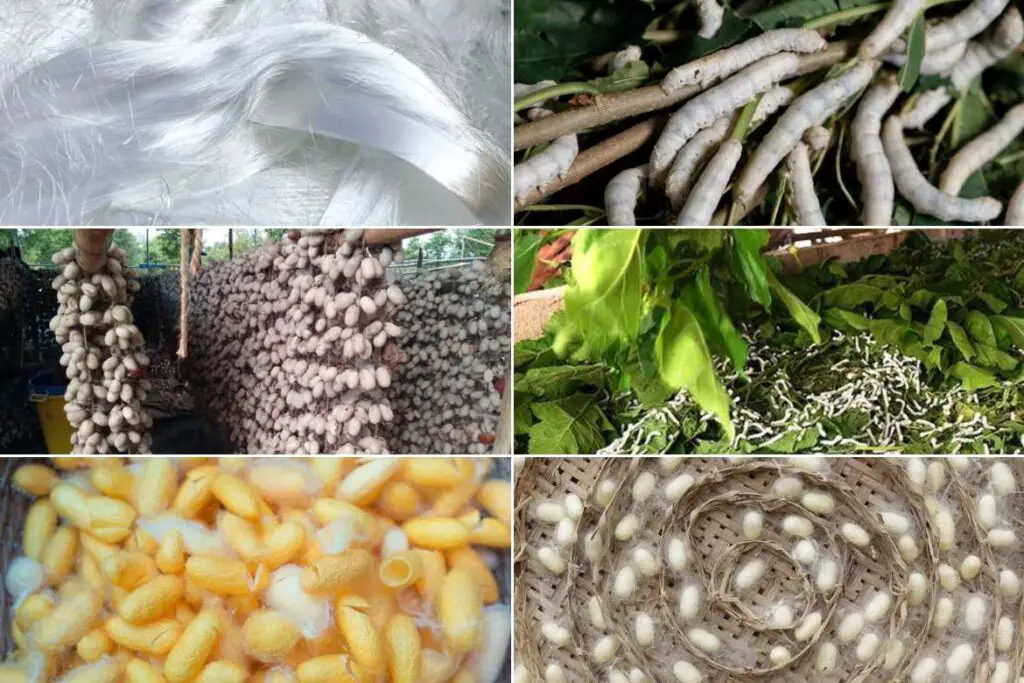
The additional costing of quality management is reduced even further by new modern methods.
The new modern methods have reduced the infections of the eggs and better quality and hygiene.
Beekeeping / Honey bee farming
Though Honey bee farming was introduced in India in 1965, it is still a very profitable niche business.
A multitude of products from honeybee farming are extracted from this agribusiness.
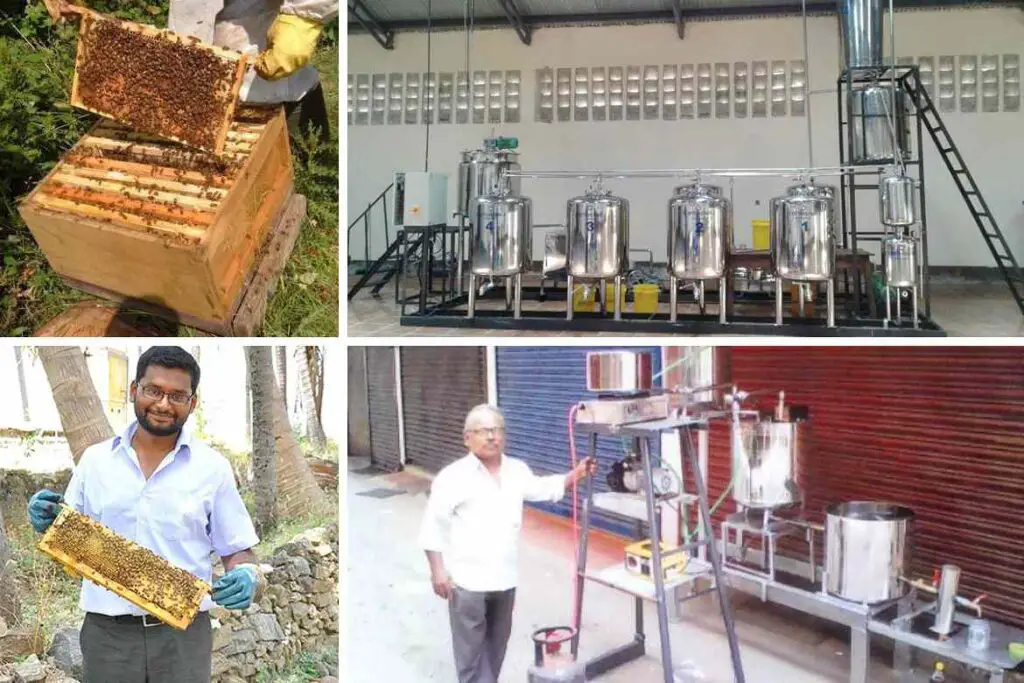
Not just honey but other products like bee venom, bee wax, royal jelly, propolis, and pollen also can be sold from the same farm to increase the profit many folds.
Butterfly Farming
Butterfly farming called as butterfly garden also is a super niche agribusiness. This is an agricultural business idea for all you people who are a little extra adventurous and need a bit of a challenge.
Butterfly farming can be done in open garden or enclosed garden. But Indian law considers butterflies in the categories of animals that cannot put into an enclosure. Hence the only option is to farm them in an open garden.
If you manage to acquire the appropriate licensing, geo-tagging, and fitting garden to rare butterflies, you will be in a very niche agricultural market. You will be able to export and sell butterfly pupae all across the globe for a handsome profit.
You also have a wonderful opportunity to start agritourism in your butterfly garden.
Lac insects farming
Lac insects farming also known as lac culture, being a relatively new agricultural business, can be very profitable because of low competition.
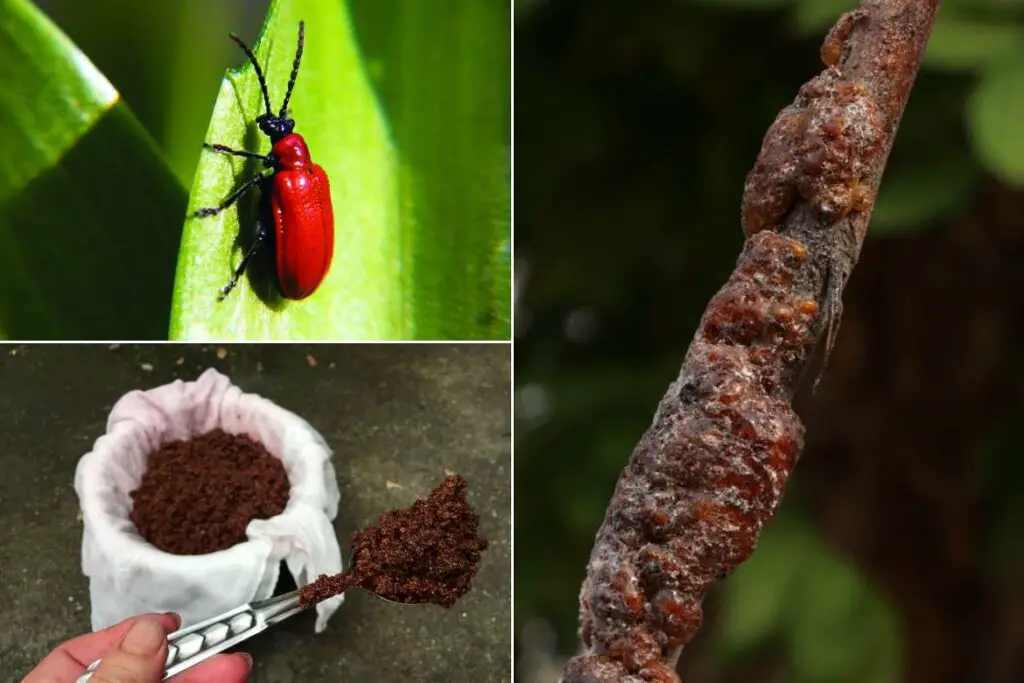
Indian lac insect Laccifer lacca is found on many trees like Banyan tree. These insects produce lac on the twigs of the host plant. These twigs can be cut and then heated to melt and extract the lac.
The lac is used in many commercial products to make dye or wood polish.
Cochineal farming
This insect grows on cactus and produces a natural vibrant red colour. Its ability to grow in subtropical areas makes it a good candidate to farm in India.

The red colour extracted from this worm is used in colouring yogurt, jam, alcoholic beverages and even ice-creams.
Cricket farming
Cricket farming is getting popular as the consumption of it grows. Due to its high protein content and unique taste, farmers have started to farm crickets. It’s also being used as live pet food.

1 Kg of dried crickets can sell for more than 2000 rupees.
Aquaculture / Fish Farming
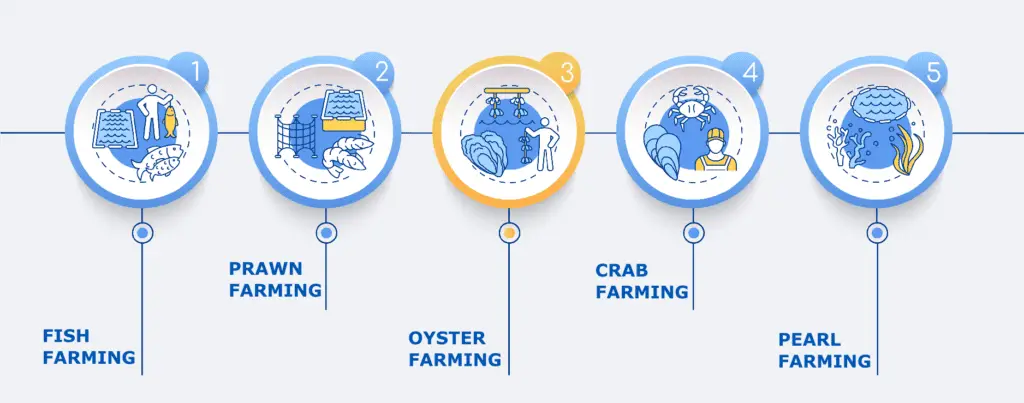
Fish farming
Fish farming in India is a huge agribusiness. Due to India’s huge costal line, the potential of increase in the number fish farms and production of farm reared fish is astronomical.

There are many commercial fish like Rohu, Catla, Marigal, Pangasius and many more can be farmed to have a successful aquaculture business.
Fish hatchery
A fish hatchery is a nursery for very young fish hatchlings. The fish, prior to being transferred into a pond or tank for farming, is grown to a “fry” (young fish capable of eating on its own).
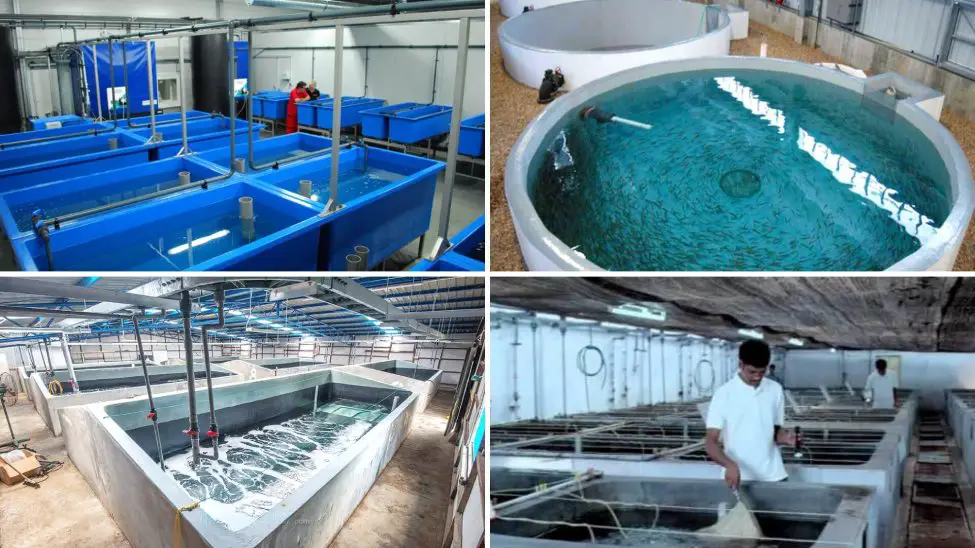
It’s a very lucrative but highly technical business. All the fish farms can only operate if the hatcheries are able to provide them with fishes to farm.
You will require more expertise and more controlled equipments to carry out the fish hatchery business.
Prawns / Shrimp farming
India is the world’s biggest prawn producer. Prawn farming took India by storm in India’s aquaculture market. Indian prawns’ farmers have successfully farmed prawns like giant tiger prawn, green tiger prawn, Penaeus indicus, banana prawn and yellow prawn.
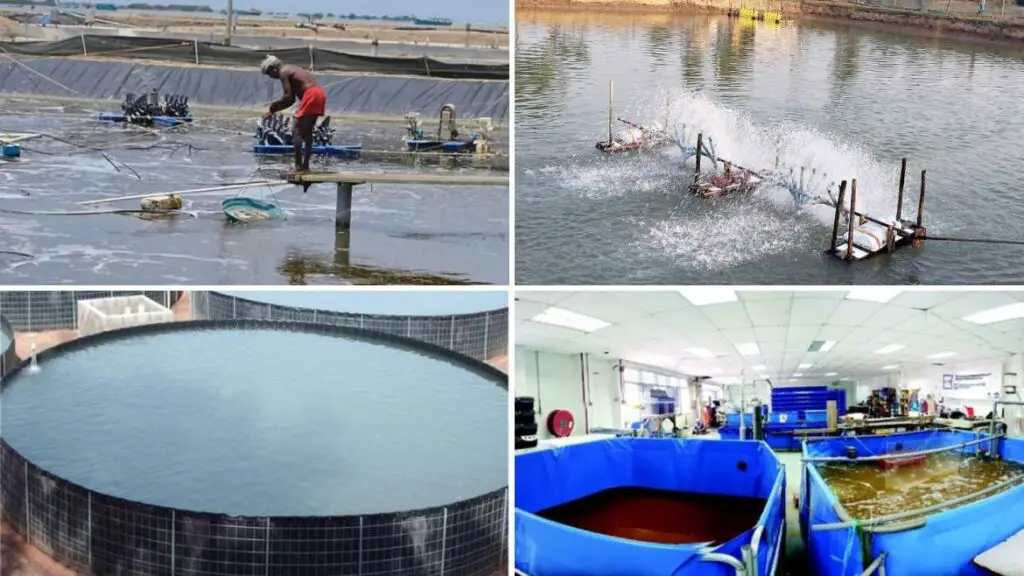
Prawns are highly susceptible to diseases. In recent years a disease called white spot disease spread like wildfire in a lot of prawn farms.
A training course from Marine Products Export Development Authority (MPEDA) or Rajiv Gandhi Centre for Aquaculture (RGCA) is advisable before starting with aquaculture.
Mud crab farming
Crab farming culture has developed very fast after its commencement in the early ’80s in India. Like all the other aquaculture businesses, crab farming is also a highly profitable business.
Rajiv Gandhi Centre for Aquaculture (RGCA) conducts training for budding entrepreneur farmers and teaches them how mud crab farming is done.

Two types of crabs are sold commercially in India, (Scylla Serrata) green mud crab and red mud crab.
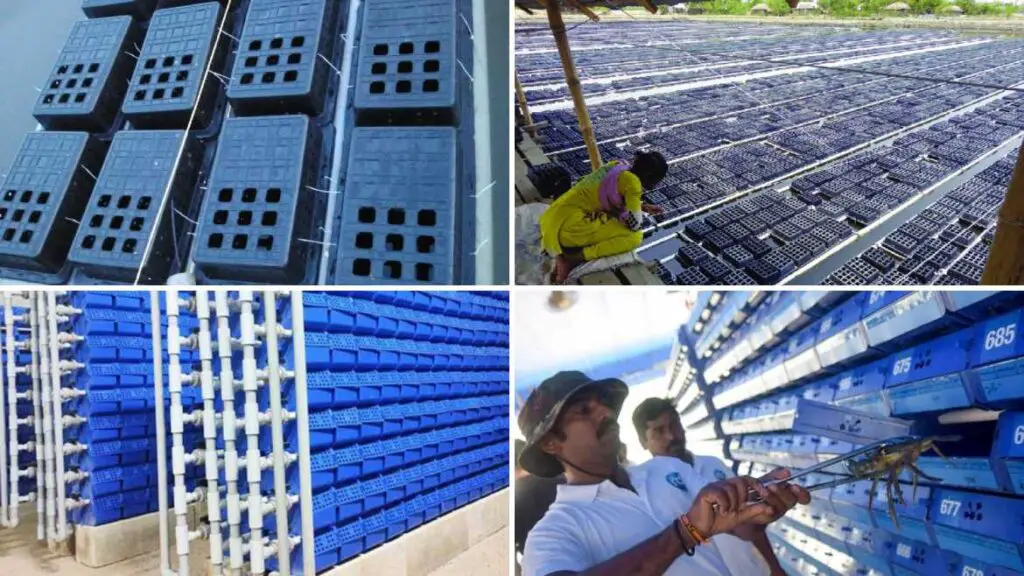
Red mud crabs are not farmed in ponds as they have the tendency of digging up to 30 feet deep in mud and escaping the pond. Red mud crabs are also smaller in size.
Green mud crab farming is done as they cannot dig deep in the pond and are also able to grow in a bigger size. A giant green mud crab can cost up to 1400 rupees.
Ornamental fish farming
Ornamental fish farming is the division of fish farming that deals with the farming of aesthetic fishes to be kept in a home or commercial aquariums.
Domestic Aquarium trade is estimated at about Rs.500 crore (2019-20), providing earnings to 5 lakh households in India. Out of 180 billion USD, 24 Billion USD is contributed by ornamental fish farming globally.

(2017-18) The value of exports was approximately Rs. 8.40 crore, with an average increase of 11.6% per year. Kolkata, Chennai, and Kochi are the principal production centers.
There are approximately 5,000 production units, primarily located in West Bengal (55%), Tamil Nadu (30%), Kerala (5%), Maharashtra and other coastal states (7%), North East and island states (3%).
Comparatively, ornamental fish farming requires less space.
Continues high demand for ornamental fishes makes it very easy to find buyers. More than 300 ornamental fish species are farmed in India.
Pearl farming
Pearl farming takes a little while to start giving profits as it takes almost a year for the mussels to make pearl. But once the business is setup, it is, if not the most, one of the most profitable aquaculture business to undertake.
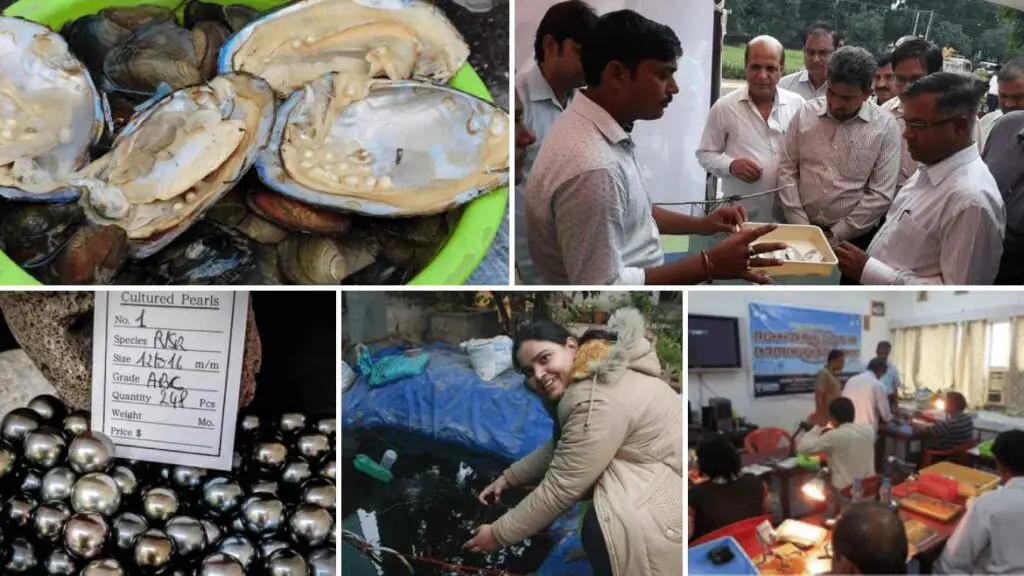
Due to the meager investment required (a mussel can cost just 5-9 rupees) and the requirement of a small pond of 10 x 10 feet, many of the farmers are starting this business as a side business before expanding it and turning it into their primary source of income.
The water pH level of 7-8 and temperature of about 25-30 degree Celsius are crucial for pearl farming
Oyster farming
Oysters are one of the most widely cultivated marine species. They are mainly grown in coastal parts of Maharashtra and Kerala, the western states of India.
Kasturi Dhoke, an excellent case study of oyster farming, started this business when her village, Wadatar, was approached by united nations development plan in 2013. UN provided them the finance and the know how of oyster farming and rest is history. She formed a self help group called Prasidhi, teaching woman how to farm oyster.
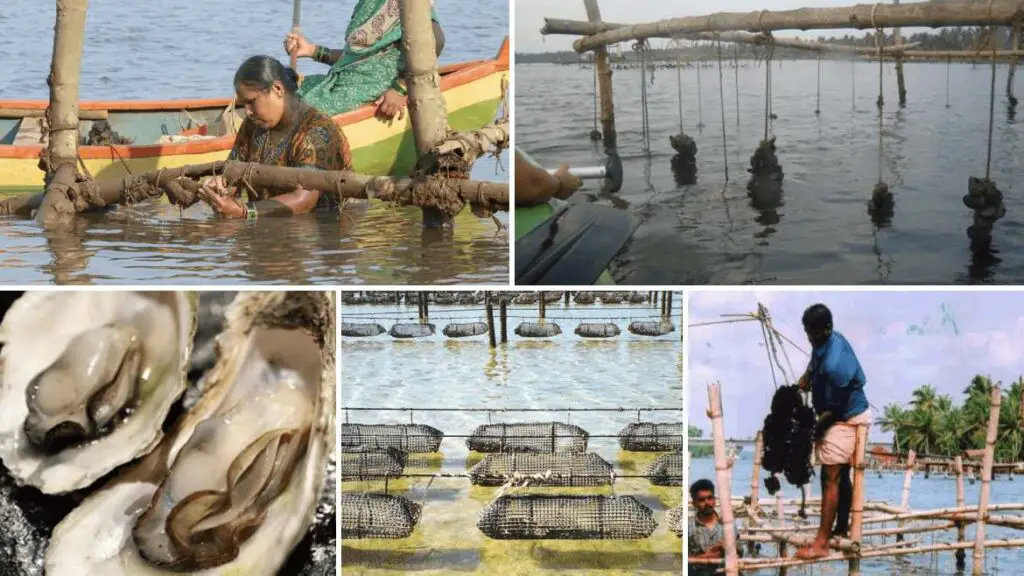
Oyster farming is very profitable as an investment of mere 6000 rupees yields a profit of 50000 rupees. There is no requirement of food supplementation as oysters can feed on plankton and waste. In 12-14 months you can harvest commercially viable oysters.
This business has a big potential of growing more as 85% of natural oyster reefs destroyed because of increasing water acidity of the ocean and over harvesting.
Agricultural manufacturing and agricultural processing
Fruit Juice production
Availability of ready market makes fruit juice production a very compelling agricultural business.
India being one of the largest producers of fruits, fruits at lower price can be bought directly from the farm even if you don’t own a farm.
Honey processing
Procuring honey from honeybee farms and processing and packaging it by removing wax can be a very profitable honey business.
Getting honey from organic farms can boost your marketing.
You can sell it in wholesale or retail.
I would advise to start with mechanical machines and then expanding to automatic machines
Bee wax processing
Not only honey from bee farming but also bee wax has many uses. Bee wax is used in home remedies for swelling and ulcer.
It has got commercial uses in the food industry, candle making and cosmetics. You can process bee wax and sell it to big companies.
Spice powder processing
India being the biggest spice producer, does not have any shortage of spice farms.
Turmeric powder, Chili powder, Garam masala, Coriander powder and many other spices not only have colossal demand locally but can be exported to increase the profit many folds.
There are different types of processing units ranging from basic grinders to cryogenic grinders.
I would recommend to start small and try and dominate the local market before targeting more significant markets. Though expensive, export of splices like chilli and turmeric is highly profitable
Oil production
Extraction of oils from herbs, flowers, spices, nuts, and wood is a good business.
You can extract oils like Coconut oil, groundnut oil, mustard oil, walnut oil, Almond Oil, Avocado Oil, Canola Oil, Corn Oil, Cottonseed Oil, Grapeseed Oil, Hazelnut Oil, Sunflower Oil, Palm Oil, Pine Seed Oil, Pumpkin Seed Oil, Safflower Oil, Sesame Oil, Soy Oil, Sunflower Oil and sell it in wholesale or retail.
These oils have a multitude of uses, from cooking, manufacturing of ayurvedic herbal oils, soaps, detergents, massage oils, hair oils to industrial applications.
Flour milling agriculture business
The consumption of all kinds of flours (All-Purpose Flour, Bread Flour, Cake Flour, Pastry Flour, Self-Rising Flour, Vital Wheat Gluten Flour, White Whole Wheat Flour, Whole Wheat Flour, Maize Flour, Millet Flours) is always going to go up.
This business will require initial capital. But once set up, it can be sold locally and even can be exported.
You can also sell the byproduct of the flour mill as cattle feed.
Cashew nut processing agriculture business
Cashew cultivated locally or imported to India need processing like removal of the outer shell, sorting by size and grading, before being sold in the market in wholesale or retail.
You can set up a cashew processing unit that can process cashews of local farmers and importers.
Jam production agriculture business
Different fruits can be processed to make jam. Before starting with the business, verify your target location and audience.
I would advise to start targeting small local location and then marketing it in the state level.
Soybeans Processing agriculture business
The processing of soybean is a vast market in India. There is a very high demand for soybean and its products (soybean meat, soybean flour, soybean oil, soya protein, soya lecithin, soya paneer, soya extract).
Under Entrepreneurship Development Program, India has created a dedicated body called as Soybean Processors Association of India for the development and support of soybean agriculture, processing, farmers and exporters.
Groundnut processing agriculture business
India is the second largest producer of groundnut in the world after China.
The varieties produced in India are Amber, BG-1, BG-2, Chandra, Chitra, GAUG-1, GAUG-10, Kaushal, Kadiri-2, Kadiri-3, Kuber, Parkash, PG-1, T-28, T-64.
Andhra Pradesh, Gujarat, Karnataka, Maharashtra, and Tamil Nadu are the leading groundnut producing states in India.
Processing of groundnut/peanut can be done to get Hand-picked and selected ground-nuts (HPSG), Roasted and salted groundnuts, groundnut oil and blanched groundnut.
Potato Powder production agriculture business
Potato powder is used by big snack manufacturing companies like pringles, Lays, McDonald’s, and restaurant and hotels as a thickening agent.
This is a perfect time to start the business of potato powder manufacturing. The demand is way more than the current supply.
Demand is very high locally in India, but mostly 70% of the production is exported.
The European Union is the biggest consumer of potato powder.
Fish feed manufacturing
Aquaculture in India is growing at a rate of 4% annually since 2011.
Today, farmers are supplementing their fish feed with farm-made feed as well as commercially prepared fish feed in order to cater to the nutritional requirements of the fish. This is done to ensure good growth and health of the fish and eventually increasing the profits.
Due to continuous demand, manufacturing of fish feed and supplying it to the local fish farms is an excellent sustainable business.
This business is a sub-domain of the much broader spectrum of Animal feed manufacturing.
Animal feed manufacturing
This business encapsulates a wide spectrum of manufacturing feed for cattle, aquaculture, poultry, and pets.
Keep in mind, predominantly animal feed industry in India caters to poultry and cattle feed.
I would recommend targeting a specific niche (e.g., feed for horses) within this broad spectrum instead of going for an all-purpose feed for all cattle’s or poultry bird.
I need not mention that the animal husbandry culture is only going to go up, and hence the demand for feed will also increase.
Organic manure biofertilizer manufacturing
Organic manure or biofertilizers are one of the oldest ways of nutrient replenishment of soil.
With technological advancement, synthetic fertilizers were taking the place of biofertilizers, but the demand for organic manure is increasing again as the trend of organic farming and demand for organic produce is going up.
Organic manure manufacturing does not even require a lot of raw materials as a significant portion of it is cow dung.
One of the key initiatives by the Integrated Nutrient Supply System (INSS) (Governments promotional program for improving soil health, crop productivity and management of agricultural waste) is promoting organic manure.
Sisal production and processing agriculture business
Sisal planting in India is not very competitive as not many farmers are growing it in an organized way.
India is still importing sisal for domestic use.
Sisal has got many uses.
Its fiber can be used to make rope, marine cordage and many other industrial uses.
It is also used to make a low glycemic index sweet syrup which is 1.5 times sweeter than sugar and can replace sugar or honey.
It is also used to make alcoholic beverages like Tequila.
Since India is still importing it, locally produced sisal will be highly preferable by local buyers because of lower price.
You will need at least 1 hectare of land to make this business viable. If you wish to extract the fibres of the leaf, I should advise that you do it manually to increase the profits. Later, when you expand with more capital, then you can get machineries for fibre extraction.
Micronutrient Fertilizer Manufacturing
India being the second-biggest consumer of fertilizers after China, has a massive fertilizer market.
The fertilizer market in India is projected to be of 137.95 billion USD by the year 2023.
To start this business micronutrient fertilizer , having knowledge of the chemical industry and chemicals like boron (B), copper (Cu), iron (Fe), manganese (Mn), molybdenum (Mo), zinc (Zn), nickel (Ni), and chloride (Cl) is essential.
You will have to hire a chemist who can design the chemical formulations if you do not have a background in soil and soil nutrients required for farming.
There is a decent amount of competition. Hence starting locally and tying up with the local distributor is the preferred way to enter the market if there is limited capital.
Botanical Pesticide Production agriculture business
The biopesticide market has a substantial potential to grow. Its global market valued 3.96 billion dollars in 2020.
It can be segregated into three categories, bioherbicides, bioinsecticides and bio fungicides.
They can be further classified on the basis of active substance like Azadirachtin (neem seeds), Matrine (Sophora plant), Nicotine (nightshade family of plants), Pyrethrin (chrysanthemum flowers), and Rotenone (seeds and stem of jicama vine plant, roots of several members of Fabaceae).
Unlike synthetic/artificial pesticides, organic pesticides are less toxic, highly efficient and provide long-term solutions.
The increasing consumer awareness has made this agricultural business even more profitable and scalable.
Organic herbicide / Weed Killer Production agriculture business
The harmful effects of chemical herbicides are gaining more and more attention. The number of herbicide resistance weed is on the rise.
In 2020, India even banned 27 chemical weed killers after confirming how harmful these herbicides are for our natural ecosystem.
Farmers are now resorting to organic home remedies for weed killing such as manual removal, soil solarization, vinegar weed killer (mixture of lemon juice, water and vinegar), egg water weed killer (water used to boil egg), gin weed killer and more.
This is a very good opportunity to introduce an organic herbicide. They sell at a very good price in the market.
Keep in mind that, unlike synthetic herbicide, an organic weed killer is non-selective in nature. They are always used along with manual weeding and must be reapplied after an interval as the results are temporary.
Meat processing and packaging agriculture business
I must tell you that meat processing is a capital-intensive business as it requires you to set up a plant with machineries for slaughter, cleaning, chilling, packaging and testing. But this also makes it a low competition business as not many people are doing it because of the high initial investment.
Meat processing of chicken, seafood, goat, sheep and pork are good agribusiness ideas.
You will have to acquire a proper trade license from the local Municipal Corporation and a food safety license.
Packaged meat is highly lucrative in this era as more and more people are ordering food and groceries online and refrain or do not have the means of going to the local butcher market.
If you have limited capital, start with local supply first. Promotion and marketing of your brand are crucial and will require an initial investment.
Agricultural Service business
Agriculture business consulting
This is a business where you will have to have farming experience, or you will have to hire people who have the appropriate knowledge about various aspects of farming such as operations, crop selection, land management, financing, marketing and selling.
You can give consultancy services to budding farmers or existing farmers and sell your service to make money.
This business does not require much investment as all you are providing is the knowledge you have, and no physical commodity is in the picture.
Soil analysis lab
One of the key initiatives of our government under Integrated Nutrient Management (INM) is the soil health mission.
Governments play a major role in the promotion of soil testing for farmers so that they can accurately determine the nutrient requirements of the soil and stop wasting money on unnecessary fertilizer applications.
The government has also opened many soil testing labs to test various types of soils, but still, there is a huge gap in the initiative as all the millions of farmers cannot access these labs. To bridge this gap, private soil testing labs play a significant role.
You can open a soil testing lab and provide this service in rural areas of India. You can even operate your business from the city by using portable soil testing labs.
The cost of a lab facility might cost you around 25-30 lakhs, and the cost of a portable soil testing lab can be around 1 lakh rupees.
Agricultural equipment rental agriculture business
Agriculture farm mechanization percentage in India is still deficient. Almost 80% of the Indian farmer population is still not able to mechanical tools because of lack of proper channels and high cost.
This problem is now being solved by the agricultural equipment rental business. Now, this business can be done in many levels.
First, if you own your own private mechanical tools, you can rent it out to farmers and contractors.
Second, if you are a manufacturing company, you can rent your manufactured units.
Lastly, my most favourite way, you can act as a broker enabling vendors to find farmers to rent their equipment’s. You can charge a nominal fee as your commission.
Land drone survey service
With the advancement in technology of drowns and sensors, it was pretty inevitable to also use drones in agriculture.
Drones are being used in agriculture for spraying, survey, crop yield estimation, pest and weed analysis, crop disease detection and much more.
You can provide farmers who own huge agricultural lands, all these services by using your drones and turn your hobby into your profession.
Cold storage
The cold storage Agricultural business comes under essentials in agribusinesses. It is used for the storage of perishable foods like fruits, vegetables, dry fruits, jaggery, meats and many more. Imagine a very big freezer.
Because of the time it takes for the food to reach a customer from the farm, the freshness of the produce is compromised.
This problem is solved by cold storages, where the freshness of the product can be maintained for a more extended period of time.
Currently, the cold storage requirement of India is 61 million tons, but only 29 million tons of cold storage space is available. And hence, starting a cold storage business is an outstanding proposition now.
It’s a high capital investment business, but The Ministry of Food Processing Industries (MOFPI) has also facilitated the entrepreneurs with loan and 40% subsidy schemes.
Agriculture produces packaging agriculture business
Agricultural packaging is so vast; an entire book can be written for just this topic.
If we think about it, produce from the farms cannot be shipped all across the states or even the world by just using one packaging method.
The packaging methods used are not only lucrative in supplying the local market, but the profits increase many folds for packaging of products meant for export because of higher standards and higher rates.
The packaging method can vary depending on the type of produce like fruit, flour, vegetables, meat, crab, etc. The packaging ranges from Jute sacks to high-quality plastic sacks, from cardboard boxes to heavy-duty plastic crates, from wooden baskets to thermocol / polystyrene boxes.
Pick up one niche and start manufacturing the packaging for that commodity.
For example, if you are near a grape farming locality, manufacturing of plastic crates for grapes is a very good option.
Another example can be if you can set up a cardboard box manufacturing facility near a cold storage, you will be able to target all the customers of that cold storage.
The same idea can be applied to all kinds of flours, fishes and meats.
Must read: Role of plasticulture in agriculture and agriculture business
Seed Business
Again, one of my favorite agricultural business. This is one of the most significant segments of the agricultural business.
Farming can only be started if we sow the land with seeds. But where are these seeds coming from?
Seeds can be bought from government associations, but there is a lot of space for private players in this business too. Seeds also come from seed manufacturers, dealer and distributors.
You can grow seeds and sell the seeds in the wholesale market to customers. However, the growing of seeds comes with a lot of licensing and quality control measures.
If you want to start this business, I must recommend you should have good loss bearing capacity as a minor mistake can completely ruin the quality of your seeds.
My advice will be to start with brokerage of seeds, learning the quality and local terms, gauge the market and then deciding on going ahead with the venture.
You can buy seeds directly from manufacturers and sell them to local distributors. Or you can start your own dealership with seeds of various crops and vegetables.
Hydroponic Retail Store
Hydroponics is a new agriculture technology and is continuously evolving. There are people who do not live in rural areas who are trying to get into agriculture business.
But, the lack of accessible land and business strategy does not allow them to cultivate crop traditionally. Hence, they are leaning towards hydroponics technology, which allows them to bypass the problems they face regarding land, soil and climate.
You can cater to these customers by providing them a one-stop-shop for all the hydroponics equipment’s they might need to start their business.
To start this business, you will have to buy/rent a place with a storefront having live hydroponic systems on display and a much bigger back storeroom to keep all the equipment’s and your inventory.
Goat rental business
The goat rental agricultural business, also called as goat grazing business in many parts of the world, is becoming more and more popular as the general public and farmers are getting aware of the harmful effects of herbicides or pesticides.
If you own a goat farm, you can start giving this service to customers such as homeowners, farm owners, golf courses, and landscaping companies.
You can also be a broker for goat farmers who are willing to rent out goats but do not have the means of finding the right customers. You can charge commission for every customer you provide the goat farmer.
There are many benefits of using goats as a means of removing unwanted vegetation from the field.
- They are immune to thrones and poison Ivy and actually loves eating them
- They can be used to graze a section of the field or forest to eliminate the fire hazard
- They are light-footed and hence no soil erosion. They can pretty much operate in any terrain
- They also fertilize the field by defecating on the field while they graze
- More eco-friendly as there will be no need for harmful weed killer/herbicide
Potted Plant Sales
The demand for ornamental plants for home, office and gardens has gone up considerably. You can take advantage of this trend and start a business of selling potted plants.
You can grow the ornamental plants by any method you like and have a small nursery. Or you can directly buy small plants from other nurseries and plant wholesalers.
I would suggest buying the plants instead of starting your own backyard nursery as it allows you to change the variety of plants on the go depending on the demand and also gives you the capability of having a lot of options of plants as opposed to having a limited number of plants in your small nursery.
Instead of using the money for the nursery, use the money for marketing of your business. When the plants mature, you can transfer the plants to pots.
Your customers can range from homeowners to corporates who are looking for potted plants for their offices and lawns.
Agrotourism
Agrotourism has got a huge growth potential in India. Agritourism is even recognized by the government, which has established the Agri Tourism Development Corporation exclusively for the development of agrotourism.
Agritourism encapsulates ecotourism, geotourism, and culinary tourism. Other terms associated with Agritourism are “agritainment “, “value-added products,” “farm direct marketing”, and “sustainable agriculture”.
You can do this business in two levels.
First, if you already own a farm, you can market your own farm for agrotourism and try and attract tourists.
You will have to set up your farm first to conduct nativities for tourists like showing them operations, giving them a taste of local cuisines, making them aware of your products and local handicraft, giving them a tour of the farm and educating them on your specific agriculture business and ecosystem, arranging for a clean space for stay.
The government has taken the initiative and started its own website, http://www.agritourism.in/, so that farmers and farm owners can advertise their farms to tourist for Agrotourism.
The second mode of getting into this business is acting as a broker. As a broker, you can provide tourists to farm owners who are willing to open their farms for tourism. You can also give them proper consultancy on how to improve their farm to attract more and more tourists.
You can charge for them for consultancy and the numbers of clients you introduce.
Micro Irrigation System setting up business
The exposure and need for micro irrigation systems like Drip Irrigation, Sprinkler Irrigation, Micro sprinklers, Micro jets, Foggers, Rain Guns, Gravity fed Drip System and Semi-permanent sprinkler system is increasing every day.
Farmers are realizing the benefits of micro irrigation (labour-saving, money-saving, increased yield, increased fertilizer efficiency, water saving and more) and are leaning towards the use of micro irrigation more while trying to move away from traditional irrigation methods.
You can start a business that provides micro irrigation system instilling service to farmers, corporate or even homeowners.
Keep in mind that you will have to learn the science and engineering behind the irrigation system, and if you are starting small, you will have to train your workers too, so that they know the tips and tricks of how to install the system.
Greenhouse building
Due to changing climate and farmers realizing the ways to not depend on climate to make more profit from their business, many farmers are opting for shifting their agriculture business to greenhouse or poly house.
There are many types of greenhouses. To name a few naturally ventilated poly houses, climate-controlled poly houses, Net houses, Ridge and furrow type green houses and polycarbonate houses.
It is becoming more and more lucrative to start a business that offers greenhouse construction services in light of the high demand.
Import of exotic fruits
Not all the fruits we eat are grown in India. Especially exotic fruits non-native to India are seeing an increase in demand.
You can import these fruits from various countries and sell them yourself, sell it to wholesalers, distributors and retail grocery shop owners.
For getting into imports, you will have to acquire GST, import-export license and FSSAI certificate.
You will also have to keep track of the trending fruits in demand and the season in which they are harvested in multiple parts of the world.
If you intend to supply to big-name stores like reliance, big basket, you will also have to get your company registered with them and get a vendor license.
To be successful in this business, make sure you are one of the first companies which import the fruit at the very start of the harvest season. That is the time when you make the maximum amount of profit.
E.g., clementine from South Africa has a big demand in India. It’s primarily harvested in the month of September to December.
Export of fruits and vegetables
India being one of the largest producers of agricultural products, it is in a very good position to sell the commodities in other countries too.
India produces a wide list of fruits, vegetables, spices, meat, dairy, nuts, cattle feed and herbs which are in high demand in all parts of the world.
You can start exporting all these in two ways.
First, if you are a farm owner, you can try and find buyers internationally by registering in international trade portals and start exporting.
Second, you can be a merchant exporter who procures the product from farmers or wholesalers and then export it. In both the ways there is a decent amount of profit to be made.
You should research the availability of produce in your area and compare it to the international demands before picking a niche. There are big export houses which only deal in export of agricultural products.
There are many things you will have to keep in mind before starting with export. Such as, buyer’s genuineness, payment terms and the buyer’s country’s (ECGC Export Credit Guarantee Corporation of India Limited) ratings.
Final Thoughts and tips for Agricultural business selection
As we saw, there are many agricultural business/agribusiness ideas to start with. Before starting with any business, always be aware of your mental and financial capabilities.
- Study the market which you are willing to enter and think about how well your service is going to be received in that locality or state.
- Also, consider whether your business will require capital intensive marketing or not. Sometimes it’s easy to set up a business, but for the operations of the business to start, you might have to invest a lot of money in marketing, in some cases more than the cost of setup of the business.
- Think about if you need an online presence like a website or social media.
- Research various government schemes and financial aids. This proves to be very helpful as most of the times, financial aid and subsidy is the boost that is needed to start a business.
- Try and find out who around you are doing that business already. This will give you an idea of the competition and also you can study how they operate the business on ground level.
- Get help from friends and family. They are sometimes great help in providing you with that first buyer who keeps your business rolling and helps you in building your credibility in the market.
- Visit your local MSME office and get a consultation. They do it for free. You can also visit their library to have a look at all the project reports of various business. This will give you a clear idea of the capital required and market estimation.
- Please have a good idea of the skill level required by the workers/labourers and their availability for your business. Also, consider whether you will be able to train them or they need to be trained by an outside agency. I have seen many projects suffering or even closing because of lack of skilled manpower.
- Research on agricultural crash courses provided by government bodies. They not only help you in how to set up the operations but also help you in getting exposed to the market and buyers and clients. E.g., RGCA in Chennai conducts a wonderful course in mud crab farming at a low price. They not only do classroom training but also take you to crab farms and give you practical experience.
- When you finalize a business, get all the required licensing and keep your GST and other financial details up to date. This will save you from future penalties and paperwork.
- Always keep multiple options open for the acquisition of raw materials. Never rely on just one vendor.
- When you are studying the market, study various qualities of the same product in the market and choose wisely what quality you want to target. For example, a cheap plastic quality fruit crate is preferred for local transport of fruits, but the same crate has to be of higher quality plastic when exporting the fruit.
I hope this article by me was able to assist you in giving you an idea about various agricultural business. Please feel free to comment with your thoughts. Also, share this article if you think that this article will be able to help someone in making a decision. Any suggestion or advice will be highly appreciated. Kindly do post any questions which are still unanswered. I would be happy to assist.


